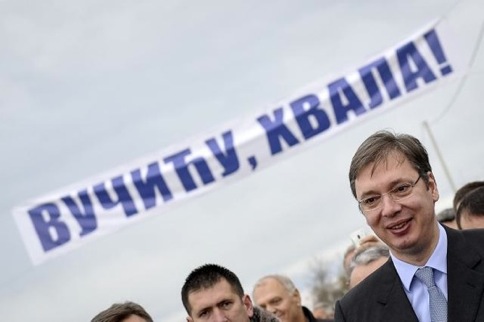

Why elections now?
As Serbia opened its first negotiating chapters with the EU in December 2015, the country will inevitably embark on many painful reforms before the negotiations can be concluded. Vučić’s supporters see the election as important in order to give the Prime Minister a full mandate, with the strong backing of society, in order to prepare Serbia for EU membership as soon as possible.
However, there are also more plausible alternative explanations to go for general elections.
First, with a high level of popularity (the latest opinion polls suggest 50% support for SNS) and a fragmented weak opposition, the election is a good opportunity to secure some more years in power. Second, the current government is based on a one-man-show in the shape of Vučić. The cadres of the ruling party are weak and often incompetent, lacking the popularity of the party leader. By making the elections more of a plebiscite - for or against Vučić - the ruling party will attempt to hide all its weaknesses, which are particularly visible at the local level. Third, frequent elections are a good way to mask the inability to deliver on major issues. Since 2012, a lot of increasingly fantastic things were promised (FAP, Smederevo Steel factory, the fight against corruption to mention some) but only few delivered. While in a constant campaign, a populist incumbent can easily distract from the process of governing. Finally, frequent election campaigns prevent the opposition from recovering from previous defeats, perpetuating a weak opposition.
The elections will reaffirm semi-authoritarian rule in the country
So far, this election promises little progress in terms of democracy or reforms – rather, it threatens to reaffirm semi-authoritarian rule in the country. Calling early elections is part of the toolbox of populist rulers with an authoritarian streak. The intent of fixed-date election legislation is to create a regular cycle of planned general elections, with specific, predictable election dates and a fixed term for the legislature. In other words, the idea of democratic elections is to have regular voting cycles every four years, not whenever one person decides. If the frequency of elections were an indicator of the quality of democracy, Serbia would be a great democracy. Unfortunately this is not the case.
Serbia lacks checks and balances to keep its governments under control. To some degree, coalition governments have been (flawed) alternatives to checks and balances. With few independent institutions, many loyal media outlets, and weak opposition, there is a risk that there will be too few critical voices in these institutions.
Although it seems unlikely that the new government will become outright authoritarian, Serbia might move away from democratic consolidation and towards a new type of illiberal system which formally commits to EU integration and internalizes the reform discourse. However, this simply means that the way it maintains its power is more subtle. In practice the Government will continue to govern through informal rules and clientelism in the form of hiring party members. Lots of citizens are bought by the system, but alternatively they have everything to lose in this economic situation. As seen in a regional perspective, there are two ideological options to disguise such practice: the first is a national conservative ideology (Viktor Orban, Nikola Gruevski), and the second, an ideology of Euro-Atlantic integration (Milo Djukanović). The truth is that both of these rhetorics are no more than a smokescreen, instrumentalized in order to discredit opposition.
The way forward
Serbia remains predominantly characterised by traditional top-down power structures, whereby governments are at liberty to influence both reforms and EU integration through a set of clientilistic networks and/or methods of more or less open pressure. It is essential to transform these networks so as to increase the influence of horizontally structured civil society on policy making (e.g. NGOs, investigative journalists, independent state institutions, etc.). In addition, efforts should be made to support constructive grassroots initiatives. Civil society empowerment should strengthen their expertise, capacities, technical organisation, and provide for regional and international networking possibilities. Furthermore, the EU should maintain its support for the inclusion of responsible civil society actors in an effort to put pressure on the government to do its job better, both before and during negotiations.
Backsliding in terms of democracy and the freedom of media can be observed throughout Serbia over the past few years. Yet, the Serbian government delivering on Kosovo and the refugee crisis has muted external scrutiny of un-democratic practices. While the EU continues to focus on the smart design of formal institutions, it seems that it is also willing to shortchange the state of democracy for the sake of other reasons, most notably stability. In the years to come the EU needs to focus on monitoring Serbia’s path to stable democracy governed by the rule of law, paying greater attention to the whole forest, not just the trees along the way.